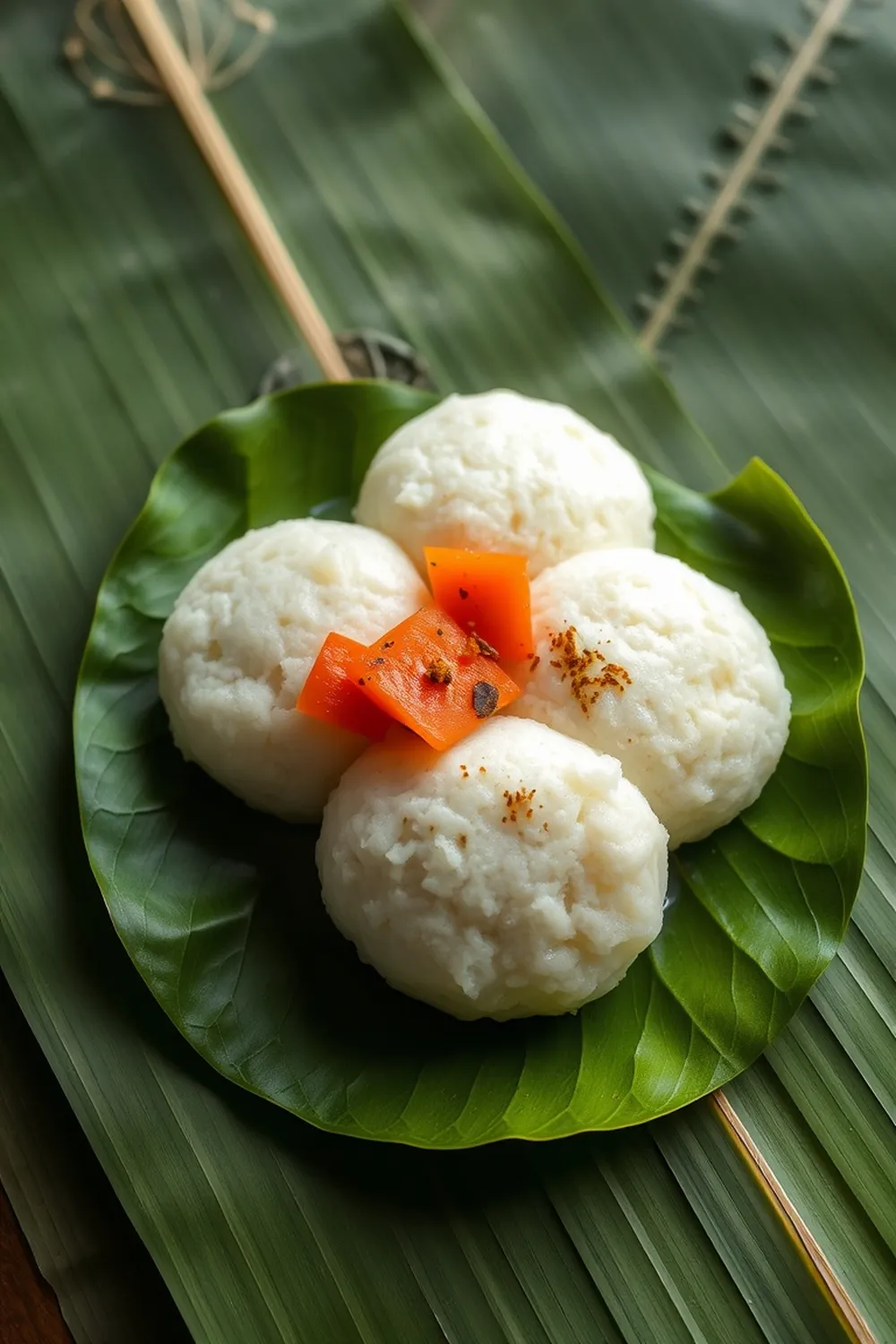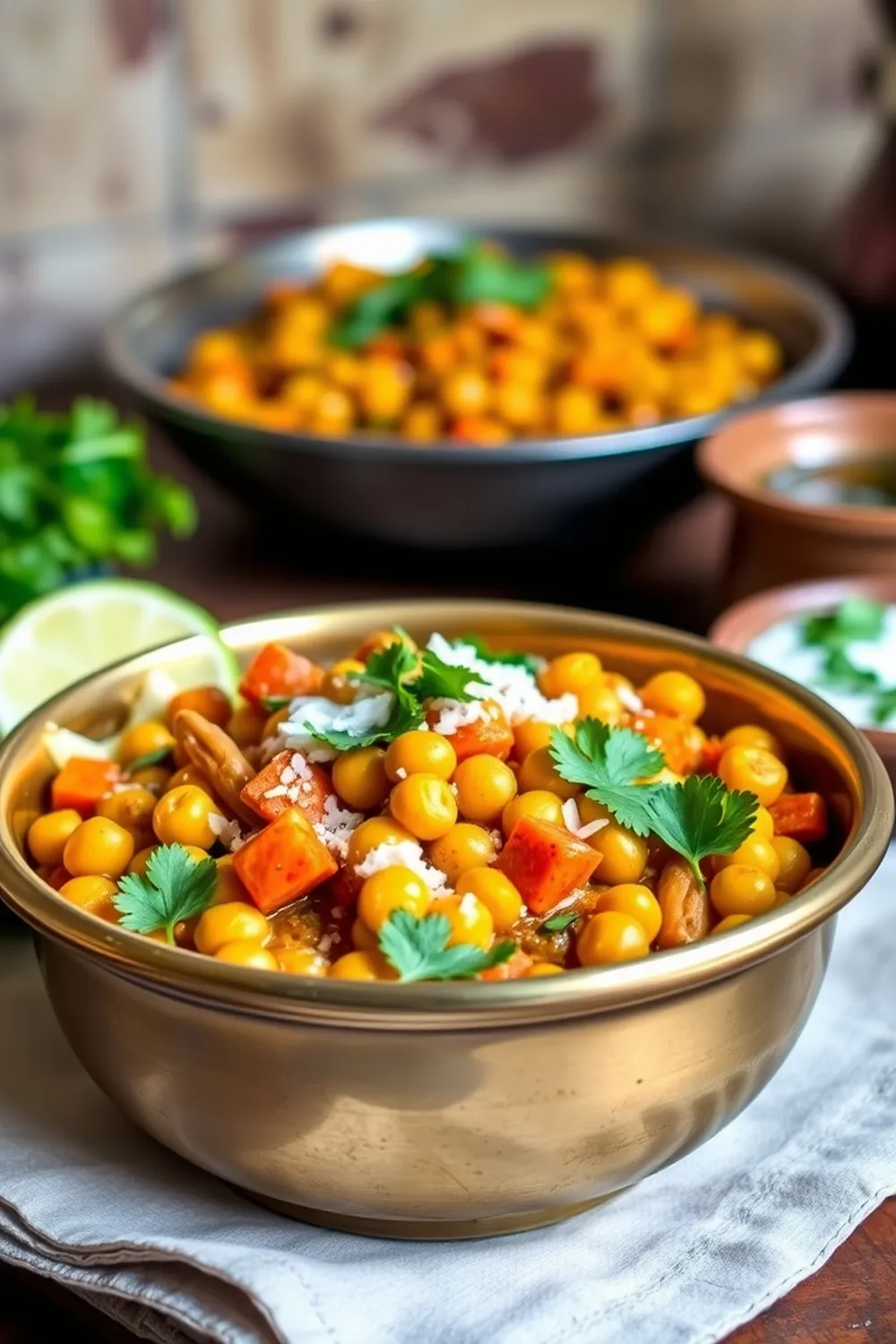- Wash jowar and poha thoroughly until the water runs clear. Soak in water for 4-6 hours.
- Separately, wash and soak urad dal and methi seeds for 2-3 hours.
- Grind the urad dal mixture into a smooth, thick batter, using ice water if needed. Transfer to a large bowl.
- Grind the soaked jowar and poha into a smooth paste. Combine with the urad dal batter.
- Mix the batter thoroughly with your hands to aid fermentation. Cover and let it ferment overnight (8-12 hours).
- After fermentation, add salt and mix gently.
- Grease idli plates, pour batter into them, and steam for 10-12 minutes.
- Allow the idlis to rest for 5 minutes before removing. Serve warm with chutney or sambar.
- Calories:120 kcal25%
- Energy:502 kJ22%
- Protein:4 g28%
- Carbohydrates:25 mg40%
- Sugar:0.5 mg8%
- Salt:150 g25%
- Fat:1 g20%
Last Updated on 4 months by Neha Deshmukh
Jowar Idli Recipe – Authentic Sorghum & Poha Steamed Cakes
Introduction
There’s just something so comforting about a plate of fluffy, warm idlis, isn’t there? They’re a staple in so many South Indian homes, and for good reason! I remember my grandmother always making idlis for us on weekend mornings – the aroma would fill the entire house. Today, I’m sharing a slightly healthier, yet equally delicious twist on this classic: Jowar Idli! These sorghum and poha steamed cakes are packed with nutrients and have a lovely, slightly nutty flavour. Trust me, once you try them, you’ll be hooked!
Why You’ll Love This Recipe
This Jowar Idli recipe isn’t just about taste; it’s about nourishing your body too. Jowar (sorghum) is a fantastic grain, and pairing it with poha creates a wonderfully textured idli. It’s a great way to introduce millets into your diet without compromising on flavour. Plus, the fermentation process makes it easily digestible!
Ingredients
Here’s what you’ll need to make these delightful Jowar Idlis:
- 2 cup Jowar (Sorghum/Cholam)
- 0.5 cup White urad dal
- 0.5 cup Poha (Pressed rice/Aval)
- 0.5 tsp Methi seeds (Fenugreek seeds)
- as needed Salt
- as needed Water
Ingredient Notes
Let’s talk ingredients! A few little tips can make all the difference.
Jowar (Sorghum/Cholam): Nutritional Benefits & Regional Uses
Jowar is a powerhouse of nutrients – it’s gluten-free, rich in fibre, and has a low glycemic index. In India, it’s particularly popular in Maharashtra, Karnataka, and Andhra Pradesh. You can usually find it at Indian grocery stores or online. I like to use the whole grain jowar for this recipe, but broken jowar works too.
Poha (Pressed Rice/Aval): Choosing the Right Type
Poha adds a lovely lightness to the idlis. You want to use the medium-thick variety – not the super-thin flakes that dissolve easily, and not the really thick ones that stay crunchy. If you can only find thin poha, just be a little gentler when mixing the batter.
Urad Dal & Methi Seeds: The Fermentation Powerhouse
Urad dal (black gram) and methi seeds (fenugreek seeds) are the key to that perfect fermentation. Methi seeds help boost the fermentation process, especially in colder weather. Don’t skip them!
Water Quality for Fermentation
This might sound strange, but the quality of water matters! Use filtered water, and avoid using water that’s heavily chlorinated, as it can inhibit fermentation.
Step-By-Step Instructions
Alright, let’s get cooking!
- First, give the jowar and poha a really good wash under running water until the water runs clear. This removes any excess starch. Then, soak them together in enough water for about 5 hours.
- While the jowar and poha are soaking, wash and soak the urad dal and methi seeds separately in water for about 2 hours.
- Now, it’s time to grind! Grind the urad dal and methi seed mixture into a super smooth, thick batter. Add ice water a little at a time while grinding to keep the batter cool – this helps with fermentation. Transfer this to a large bowl.
- Next, grind the soaked jowar and poha into a smooth paste. It might take a little longer than the urad dal, so be patient. Add water as needed to get a smooth consistency.
- Combine the ground jowar-poha paste with the urad dal batter in the large bowl.
- This is where the muscle work comes in! Mix the batter really well with your hands. This helps activate the fermentation process. Cover the bowl and let it ferment overnight (around 12 hours) in a warm place.
- The next morning, you should see the batter has risen and is bubbly! Gently add salt and mix it in. Don’t overmix at this stage.
- Grease your idli plates well with oil. Pour the batter into the idli moulds, leaving a little space for the idlis to puff up.
- Steam the idlis for about 10 minutes. A good sign is when a toothpick inserted into an idli comes out clean.
- Let the idlis rest in the steamer for a minute before carefully removing them. Serve warm with your favourite chutney or sambar!
Expert Tips
A few little secrets to help you nail this recipe:
Achieving the Perfect Fermentation
Fermentation is key! The warmer the environment, the faster it will ferment. In colder months, you can place the bowl near a warm oven (not in the oven!) or wrap it in a warm towel.
Grinding Techniques for Smooth Batter
A smooth batter is essential for soft idlis. Use ice water while grinding, and grind in batches if your mixer is small.
Steaming for Fluffy Idlis
Make sure your steamer has enough water, and that the water isn’t touching the idli plates. Don’t open the steamer lid during the first 8-10 minutes of steaming.
Variations
Want to switch things up? Here are a few ideas:
Vegan Jowar Idli
This recipe is naturally vegan! Just ensure your chutney and sambar are also vegan-friendly.
Gluten-Free Jowar Idli
Jowar is naturally gluten-free, making this recipe perfect for those with gluten sensitivities.
Spice Level Adjustment (Adding Green Chilies)
My friend loves a little kick, so I sometimes add 1-2 finely chopped green chilies to the batter.
Festival Adaptations (Ganesh Chaturthi, etc.)
During Ganesh Chaturthi, you can make mini idlis as an offering to Lord Ganesha.
Serving Suggestions
Jowar Idlis are delicious with:
- Coconut Chutney
- Tomato Chutney
- Sambar
- A dollop of ghee (clarified butter)
Storage Instructions
Leftover idlis can be stored in the refrigerator for up to 2 days. Reheat them by steaming or microwaving. You can also freeze uncooked idli batter for up to a month.
FAQs
What is Jowar and is it a good substitute for rice in Idlis?
Jowar is a millet grain, also known as sorghum. It’s a fantastic substitute for rice in idlis, offering a nutritional boost and a slightly different flavour.
How do I know if the batter has fermented properly?
The batter should have doubled in volume, be light and airy, and have a slightly sour smell.
Can I use a wet grinder instead of a mixer for the batter?
Absolutely! A wet grinder will give you an even smoother batter, but it takes longer.
What if my idlis are too hard or too soft?
Hard idlis usually mean the batter wasn’t fermented enough. Soft idlis could mean too much water in the batter.
How can I adjust the sweetness in the idlis?
Traditionally, idlis aren’t sweet. But if you prefer a hint of sweetness, you can add a teaspoon of sugar to the batter.
Can I make Jowar Idli batter in advance?
Yes, you can soak the jowar, poha, and urad dal in advance. Grind the batter just before fermentation for the best results.










